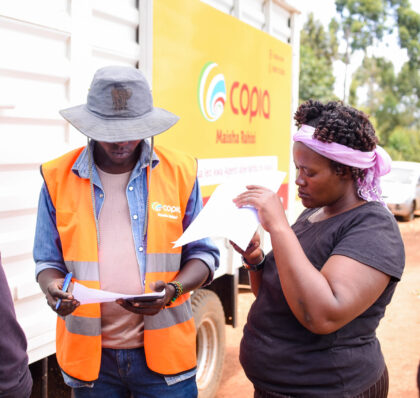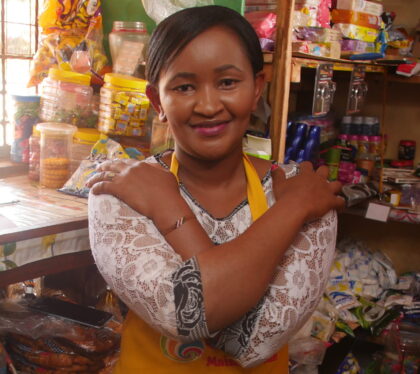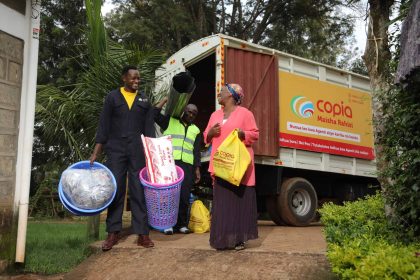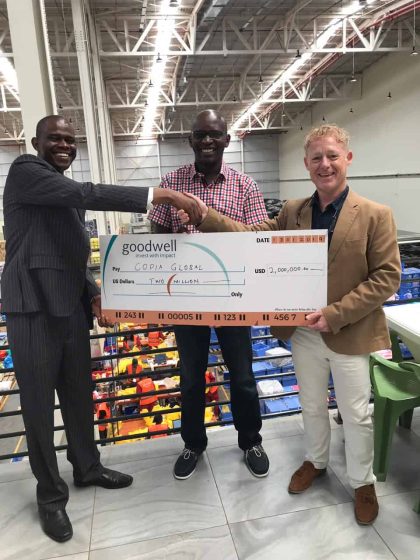

Copia: e-commerce for unconnected African customers
How do you bring e-commerce to a country where most of the people don’t have an internet connection or bank account? Copia Global shows how it is done: via 60.000 ‘agents.’
It is a busy morning for Teresia Kimani. The day after her 31st birthday, she is contemplating what treat to give to her daughter who turns 10 today. And while the line of customers in front of her shop keeps growing, she makes time to provide an online interview for this story. In the background there are packages of Blue Band margarine, combs and razor blades, waiting to be sold.
‘I used to run a hair salon here,’ Ms. Kimani explains. ‘Here’ is Kanunga, the village where she lives, just an hour north of Kenyan capital city Nairobi. ‘When a friend told me about Copia, I thought it was an interesting opportunity to become their agent and make additional income.’
A Copia agent is a shopkeeper who serves as a delivery point for Copia to deliver goods to its e-commerce customers. ‘Any online shopper in the world needs three things,’ explained Copia’s founder, Tracey Turner. ‘An internet connection, a credit or bank card and an address. Millions of people in African countries do not have those three ingredients, and have therefore always been overlooked as a viable market. The global economy has largely ignored this 800 million person market. This is why I founded Copia.’
Entrepreneur Kimani explains how it works in her village. ‘I have customers from all walks of life. Most young customers do have a smartphone so they can download the Copia app themselves. To them, my shop only serves as a pick-up point. Elder customers need more support: I show the products and the prices to them on my smartphone and then I use my account to order for them and to pay via mobile money. Two days later, the goods are delivered to my shop and the customers pick them up: they can even pay cash if they want.’
Copia, which means abundance in Latin, first piloted in 2013 and then rapidly grew. ‘We are active in urban areas, but our value proposition is more compelling in peri-urban and rural areas where products are both more scarce and more expensive,’ explained Ms. Turner. ‘Our main objective is to bring products to middle and low income customers no matter how remote they live. Instead of travelling long distances, customers can now order any household product close to home. The social impact, the improvement in customers’ lives, is immeasurable,’ she continued. The platform currently has more than 5,000 different products for sale.
The question is whether the system will also be profitable even in very remote places, in villages and hamlets hundreds of kilometres away from towns. ‘It is certainly our mission and vision to reach every customer in Africa, but obviously some places are more challenging to reach. We now deliver within two days, but in certain areas that may go up for us to remain profitable. We had discussions with an organisation in the Lake Turkana region (over 500 kms from Nairobi) who insisted that even with a longer delivery time, Copia would be hugely beneficial to the people living there,’ explained Ms. Turner.
Agents receive a percentage of the profit on every item sold. They can do so next to their existing business. ‘In my case I completely stopped braiding hair because I was too busy running the Copia business,’ Ms. Kimani explained. Hair used to bring in KSH 10.000 (Euro 77) per month. Now I make five times more on commission’, she said. ‘I like spending my money on expanding my business, taking care of my household and paying school fees for my two children, who I raise all by myself.’
Although Copia’s business model is built around e-commerce, Ms. Kimani does keep some products on hand so customers can see and touch them before buying. This builds trust with customers. ‘Certain products are sold in such quantities that it is better to have some in stock,’ she said. Most popular are diapers and seasonal things, like vegetable seeds and fertilisers. ‘And when the children resume school after the long Christmas holiday, it is always very busy with people purchasing school material.’
Copia has attracted a lot of investment, including from Amsterdam-based Goodwell. ‘As the lead investor of our Series C fundraise, Goodwell has been instrumental in attracting other investors to Copia,’ explained Ms. Turner. ‘That kind of leadership is invaluable as investors frequently look to other investors for guidance.’ She says the company is doubling in size every year and is still only scratching the surface of the opportunity in Kenya and Uganda where it intends to be a multibillion dollar business. Turner says the company will then expand into multiple other African countries. ‘In the future we plan to expand our product offering as well. If we can leverage our existing distribution network to provide health products and medicines, for example, we can have even more impact.’
Back in Kanunga, entrepreneur Kimani says she can answer only one more question, while looking over the laptop screen to the line of customers in front of her shop. ‘I have a tv screen in my shop, that advertises the latest Copia products,’ she said. ‘It is not connected to the internet, so I keep showing the same adverts. If we can connect this to WiFi and advertise the latest products, I can probably boost my sales and income even more. But I must go now, I can’t make my customers wait any longer!’
Written by Arne Doornebal

